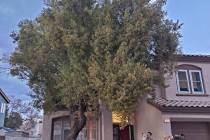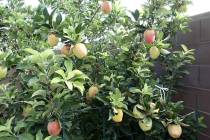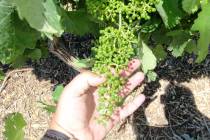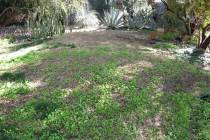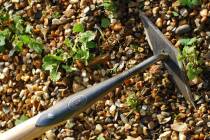Pepper plant size depends on the variety. The recent trend in vegetable transplant hybridizing for home gardens is for closer spacing and early production.
- Home
- >> Local
- >> Local Columns
Bob Morris
Bob Morris is a horticulture expert living in Las Vegas and professor emeritus for the University of Nevada. Visit his blog at xtremehorticulture.blogspot.com. Send questions to Extremehort@aol.com.
Kurapia was started from the native plant, Lippia nodiflora, native to the tropical and subtropical areas of South America and the United States. That calls into question its tolerance to extreme desert temperatures and low humidity.
It is important to follow all federal, state or local laws or ordinances pertaining to the use of a pesticide — whether it is used to kill weeds, insects, protect plants from diseases or terminate the life of a critter — and that any pesticide is used as a last resort.
When it is young, a bottletree needs about 20 to 30 gallons each time it is watered. But the soil shouldn’t be continuously wet six days a week. The roots need a chance to breathe.
When phosphorus is available, it helps plants flower and grow roots. But for new plants, it’s a good idea to have it present from the start. If phosphorus is in short supply, it can cause stunting and poor growth.
African sumac is considered somewhere between mesic and xeric in its water use. It’s not a true desert tree, but it can handle both a desert landscape and non-desert as well.
I have had some reports of poor fruit production with Gala grown in the desert, but I have not found that to be true.
There are natural products that you can apply for controlling grubs of June beetles, including insect-devouring — but plant-friendly — nematodes.
Rose of Sharon is a hardy and fun deciduous shrub for our climate. It’s considered mesic in its water use and not meant for desert landscapes.
If young trees are given a lot of nitrogen fertilizer then new growth will be pushed at the expense of flowering.
Desert climates are notoriously low in humidity, particularly as the day gets warmer, so we enjoy fewer plant diseases and worry about them less than in places with humidity.
Plants like mesquite, palo verde and acacia are xeric in their water use. They use less water than alternative trees and shrubs and are controlled with applications of water.
Once a landscape design is finished, the amount of water it needs is fixed. You won’t be able to change the amount it needs, by much, without removing plants or changing them.
Weed control is the No. 1 pest problem for farmers. Pests include insects, diseases and weeds, not just insects.
The three worst weeds to control in home landscapes are common Bermuda grass, nutgrass and palm seedlings. Controlling common Bermuda grass and nutgrass organically requires persistence — knocking them back as soon as they appear until they finally start surrendering around late summer.









